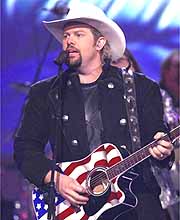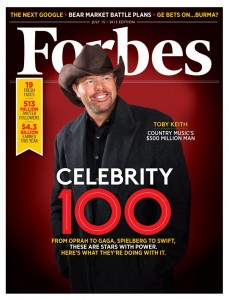Written by Kevin Lefkowitz. 2 March 2016.
Calling Toby Keith a controversial figure does the word “controversial” an injustice. Keith has been the subject of many news stories, ranging from public squabbles with other artists to accusations of racism. His notoriety reached an all time high with his public feud with Natalie Maines, but certainly spiked upon releasing “The Taliban Song.” He recorded this song in 2003 after performing it for military audiences multiple times. He had written the song to boost morale of the troops fighting the war in Afghanistan. Just before Keith recorded “The Taliban Song”, the United States had invaded Iraq and many people had begun fervently attacking U.S. military involvement in the Middle East. Toby Keith has never shied from speaking his opinion, and has branded himself in a way that he seeks to use blue-collar credibility to make white-collar money. His brash personality has earned him many critics, but also has established a very specific fan base. By appealing to a specific audience, Keith has managed to convert controversy and notoriety into an increase in popularity among his target group.
“The Taliban Song” is extremely catchy and, at first, seems like a funny, innocent song. It pokes fun at the Taliban, so who can complain about that? Well, critics claim the song also invokes a sense of racism and false patriotism. Well then. Keith co-wrote the song with Scott Emerick (and later recorded it with Emerick) from the point of view of an innocent Afghan man in Afghanistan who prays for the Americans to free him from the Taliban’s reign. Unfortunately, many people believe the lyrics used to establish the Afghan man’s perspective negatively stereotype Muslims as backwards or uncivilized. (CBS) To fully understand why Keith wrote, and later recorded, this song, we first need to look at what made Toby Keith, Toby Keith.
Born Toby Keith Covell in Clinton, Oklahoma on July 8, 1961, Keith became interested in music at a young age when he listened to musicians playing at his grandmother’s restaurant. He formed a band, Easy Money, with his friends when he was twenty years old and began performing for audiences at local bars. Unfortunately, when he tried to distribute demo tapes in Nashville, few people seemed interested in his music. He almost gave up on his dreams of becoming a country music star until a flight attendant gave his demo tape to a Mercury Reynolds executive, jumpstarting his career.
He released his first hit single, “Should’ve Been a Cowboy” in 1993 and, like many other country stars of the time, began branding himself as a cowboy-patriot-red-blooded-hardworking-American. (Tampa Bay Times) With this reputation, Keith’s popularity skyrocketed among those who identify strongly with patriotism and anti-establishment. For example, he has recorded songs such as “Honky Tonk U” in which he labels himself a “red-white-and-blue-blood graduate of Honky Tonk U.”(Haddon) He also did not need to fake patriotism, and has written and recorded many songs to honor his late father.
Keith’s father served in the military and instilled a sense of patriotism into Keith. Perhaps Keith’s most famous and controversial patriotic song, “Courtesy of the Red, White, and Blue (The Angry American)”, sparked a feud between Keith and fellow country star, Natalie Maines. Keith had written this song in 2002 after his father had passed away in a car accident and in the aftermath of 9/11. Critics stated that lyrics such as
“Soon as we could see clearly
Through our big black eye
Man, we lit up your world
Like the Fourth of July.”
invoke a sense of apathy of the plight of the innocent citizens of Afghanistan who suffered through American airstrikes. Additionally, critics found the imagery of the Statue of Liberty “shaking her fist” off-putting and the idea that “putt[ing] a boot in [the enemy’s] ass, [is] the American way” repugnant. Maines stated that the song is “ignorant, and…makes country music sound ignorant.” When Keith responded by labeling her a “lousy songwriter”, she wore a t-shirt with the letters “FUTK” (or fuck you Toby Keith). This feud lasted many years until Al Gore tried uniting them in a public service announcement for combatting climate change. (Betts)
“Courtesy of the Red, White, and Blue (The Angry American)” did more than simply create controversy. It established Keith as the man who “said what everyone is thinking” and a real, “red-blooded American.” Additionally, Keith has performed more than two hundred shows to over 250,000 men and women in uniform over the course of his career. (Reuter) By branding himself as a red-blooded, patriot American, Toby Keith has created himself a very specific fan base in which he can direct his seemingly controversial material. He uses the controversy as publicity for this fan base in a way many believe Donald Trump drums up support for himself in the current presidential election cycle.
One of the most controversial songs Keith has recorded is “The Taliban Song.” At first, Keith only performed “The Taliban Song” to military audiences. (Samsung) He wrote the song to help raise the morale of the soldiers in Afghanistan. They had been fighting in a war many American citizens protested and Keith considered it his duty to help alleviate their stresses. Another one of his goals was to show how the United States helped out the Afghan people who “praye[ed] for the Americans to free” them from the evil Taliban. By showing that the Americans acted bilaterally, and not for selfish reasons, he attempted to dispel some of the criticism aimed at the soldiers fighting on the front lines. Essentially, he argued why would the United States, the most powerful country in the world, ignore the poor Afghans’ pleas for help? He recorded the song as part of his (of course) controversial album, Shock’n Y’all, in 2003, further publicizing it and subjecting it to a broader audience. Though he had good intentions, many people believe the following lyrics make the song ignorant, if not entirely prejudiced:
“I’m just a middle-aged, middle-eastern camel herding man
I got a little, 2 bedroom cave here in North Afghanistan…
Now I ain’t seen my wife’s face since they came here
They make her wear a scarf over her head that covers her from ear to ear.”
Additionally, Keith seems to imply Iraq and Iran contributed to the horrific attacks on September 11th, further fueling the controversy. When asked by CBS what he would have to say to people who consider the song Islamophobic, he replied “You could say a lot of those topics you just covered there … you could say that about any of my songs,” says Keith, laughing. “That is the reason that they don’t like us, because we are so American. So, you know, that the gifts that we have here and the freedoms that we have here are … is the one thing that makes the militants as mad as they are — at us anyway. And that’s everything I sing about.” (CBS) Though he could not care less if his music offends people, his fan base certainly cheers on his every antic, no matter how prejudiced or absurd. They cheer because they view his antics as beneficial towards the war effort.
Toby Keith released Shock’n Yall at a time many musicians would love to call their peak. He had already recorded 7 albums and amassed twelve number one singles. Since then, he has released eight number one singles, has written and starred in a (probably terrible) movie, and has opened a bar and grill in several cities across America. (IMDB) In fact, for a blue-collar guy, he is doing pretty well.
Forbes Magazine labeled him the “Cowboy Capitalist” and reported his worth at more than $500 million! (O’Malley)
Even though a lot of people resent Toby Keith for his outspoken ways and controversial political views, there is no doubt that he has earned himself quite a living. He has used the controversy as a way to make himself even more popular among his target audience, and “The Taliban Song” is a perfect example of how he has done exactly that. Because the song combines a catchy tune with amusing lyrics, it epitomizes ignoring political correctness for the sake of entertainment. Maybe “The Donald” would increase his poll numbers if he used Toby Keith’s music as a soundtrack for the campaign. After all, they were both registered Democrats until 2008!
Works Cited
“Beer for My Horses.” IMDb. IMDb.com, n.d. Web. 24 Feb. 2016.
Betts, Stephen. “Top 10 Feuds in Country Music.” The Boot. Ed. Sterling Whitaker. The Boot, n.d. Web. 24 Feb. 2016.
Daly, Sean. “Cowboy Hat Losing Its Cool among Country Singers.” Tampa Bay Times. Tampa Bay Times, 20 June 2013. Web. 24 Feb. 2016.
Haddon, Cole. “Toby Keith Seeks Blue-collar Cred to Net Him White-collar Cash.” Phoenix New Times. Phoenix New Times, 10 July 2008. Web. 24 Feb. 2016.
Leung, Rebecca. “Courtesy Of The Red, White & Blue.” CBSNews. CBS Interactive, 28 Oct. 2003. Web. 21 Feb. 2016.
“Natalie Maines (Dixie Chick Member) Bashes Toby Keith’s Patriotic Anthem.” Top40-Charts.com. Top 40 Charts, 8 Aug. 2002. Web. 21 Feb. 2016.
O’Malley Greenburg, Zach. “Toby Keith, Cowboy Capitalist: Country’s $500 Million Man.” Forbes. Forbes Magazine, 26 June 2013. Web. 24 Feb. 2016.
Reuter, Annie. “Toby Keith to Perform At PGA Tour’s Military Appreciation Day.” Taste of Country. Taste of Country, 20 Feb. 2016. Web. 24 Feb. 2016.
“The Taliban Song by Toby Keith.” Toby Keith Song Statistics. Samsung, n.d. Web. 24 Feb. 2016.


